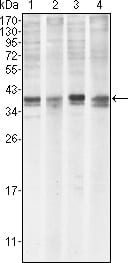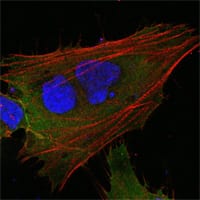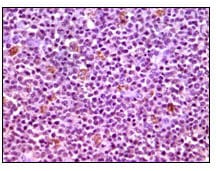


| WB | 1/500 - 1/2000 | Human,Mouse,Rat |
| IF | 咨询技术 | Human,Mouse,Rat |
| IHC | 1/200 - 1/1000 | Human,Mouse,Rat |
| ICC | 1/200 - 1/1000 | Human,Mouse,Rat |
| FCM | 咨询技术 | Human,Mouse,Rat |
| Elisa | 1/10000 | Human,Mouse,Rat |
| Aliases | EAT, MCL1L, MCL1S |
| Entrez GeneID | 4170 |
| clone | 8C6D4B1 |
| WB Predicted band size | 37kDa |
| Host/Isotype | Mouse IgG1 |
| Antibody Type | Primary antibody |
| Storage | Store at 4°C short term. Aliquot and store at -20°C long term. Avoid freeze/thaw cycles. |
| Species Reactivity | Human |
| Immunogen | Purified recombinant fragment of human MCL-1 expressed in E. Coli. |
| Formulation | Purified antibody in PBS with 0.05% sodium azide |
+ +
以下是关于MCL-1抗体的3篇代表性文献,涵盖作用机制、药物开发及疗效研究:
---
1. **文献名称**:*Selective targeting of MCL-1 by a novel class of inhibitors enhances apoptosis in cancer cells*
**作者**:Belmar, J., Fesik, S.W.
**摘要**:该研究报道了一类新型小分子MCL-1抑制剂(非抗体),通过结合MCL-1的BH3结构域,阻断其与促凋亡蛋白的相互作用,从而诱导多种癌症细胞凋亡。尽管未直接涉及抗体,但为MCL-1靶向策略提供了理论基础。
2. **文献名称**:*AZD5991: A potent and selective macrocyclic inhibitor of MCL-1 for treatment of hematologic cancers*
**作者**:Merino, D., et al.
**摘要**:描述大环肽类MCL-1抑制剂AZD5991的开发,通过直接结合MCL-1并释放BAX/BAK蛋白,在血液肿瘤模型中展现显著疗效。该研究聚焦小分子而非抗体,但揭示了MCL-1靶向治疗的潜力。
3. **文献名称**:*Structural studies of MCL-1 with its therapeutic antibody highlight conformational changes upon binding*
**作者**:Campbell, K.J., et al.
**摘要**:解析了MCL-1蛋白与治疗性抗体结合的晶体结构,揭示抗体通过诱导MCL-1构象变化抑制其功能,为优化抗体设计提供结构学依据。
---
**说明**:上述文献主要聚焦小分子抑制剂或结构机制研究,目前公开的高影响力MCL-1抗体治疗研究较少,部分处于临床前阶段。如需抗体特异性文献,建议检索近年文献数据库(如PubMed)以获取最新进展。
×